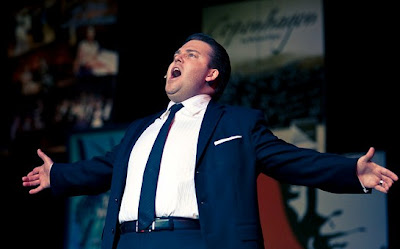 Robert Creighton recreates a number from Cagney!,
Robert Creighton recreates a number from Cagney!,an award-winner Monday night for Florida Stage.
(Photo by Tony Schreiber)
By Hap Erstein
If you are looking for Carbonell statuettes today, look southward.
Monday evening’s 34th annual Carbonell Awards ceremony was a low-key, well-produced event that tilted strongly towards theaters in Miami-Dade County. In fact, to two theater companies in Coral Gables — Actors’ Playhouse and Gable Stage — which walked off with most of the booty: six and five awards, respectively, for excellence in professional theater in South Florida.
All six wins for Actors’ Playhouse were for the mega-musical Les Miserables, a huge gamble for the Miracle Mile company that paid off handsomely when it was named 2009’s best musical production, and also cited for best director (David Arisco), best musical director (Eric Alsford), best scenic design (Sean McClelland) and best supporting actor and actress in a musical (Gary Marachek, Gwen Hollander).
GableStage divided its five Carbonells between David Mamet’s Speed-the-Plow — best production of a play, best director (Joe Adler) and best actor (Paul Tei) — and the political thriller Farragut North — best ensemble and best supporting actor (Gregg Weiner).
Both Les Miz and Speed-the-Plow were popular, predictable choices, as their producing companies continued their dominance of the three-county awards and scholarships program.
The news was less cheery in Palm Beach County, where none of the four major troupes left empty-handed, but it was close. Among them, they were only able to muster five Carbonell wins.
Clive Cholerton accepts a Carbonell Award on Monday for Vices: A Love Story. (Photo by Tony Schreiber)
In his first season as artistic director of the Caldwell Theatre in Boca Raton, Clive Cholerton was the “big” winner in the county. His inaugural production, Vices: A Love Story, a world premiere musical on relationships and bad habits won twice — for best choreography (AC Ciulla) and best actress in a musical (Holly Shunkey, the lithe, athletic lead dancer). Cholerton had already announced that he was bringing Vices back for a return engagement in the fall.
Florida Stage had a single win, but it was for Cagney!, the musical biography of James Cagney, that was designated the year’s best new work. Palm Beach Dramaworks had to be content with a Carbonell for Brian O’Keefe’s costume designs for A Doll’s House and The Maltz Jupiter settled for a win for Broadway veteran Brad Oscar, best actor in a musical for the title role of Barnum.
A popular winner Monday night was Barbara Bradshaw, named best actress in a play for her comic performance in Christopher Durang’s Why Torture Is Wrong and the People Who Love Them at Plantation’s Mosaic Theatre. Hers was the only Carbonell that went to a Broward County theater. Her acceptance speech was the emotional high point of the night, as she dedicated the award to her late son, who died last year in a surfing accident.
Other Carbonell winners, all from Miami-Dade, included:
* Lighting design — John Manzelli, Macon City: A Comic Book Play, The Naked Stage.
* Sound design — Matt Corey, Broadsword, Mad Cat Theatre Company.
* Supporting actress, play — Elena Maria Garcia, Summer Shorts: Signature Shorts, City Theatre.
 Barbara Bradshaw won a Carbonell on Monday for her work in Why Torture Is Wrong and the People Who Love Them. (Photo by Tony Schreiber)
Barbara Bradshaw won a Carbonell on Monday for her work in Why Torture Is Wrong and the People Who Love Them. (Photo by Tony Schreiber)
Of the special, non-competitive awards, the George Abbott Award for outstanding achievement in the arts went to Florida Grand Opera General Director and CEO Robert M. Heuer, who is celebrating his 25th anniversary with the company. The Bill von Mauer Award, named for a deceased local theater journalist, which goes to a theater company for overall excellence, went to GableStage.
The evening was executive-produced and directed by Amy London, the incoming president of the Carbonells organization. She again put the emphasis on local talent, with musical numbers recreated from the five best musical nominees.
This was the year that the Carbonells almost did not happen, when the program’s board announced a suspension of the award-giving to buy time to fix a system perceived by many as seriously flawed. But the theater community strongly objected, saying in effect that an awards program inherently has points of controversy, but having it is better than not.
Efforts to improve the Carbonells continue, as some theaters undoubtedly will continue to grumble, for that’s what awards are about.
